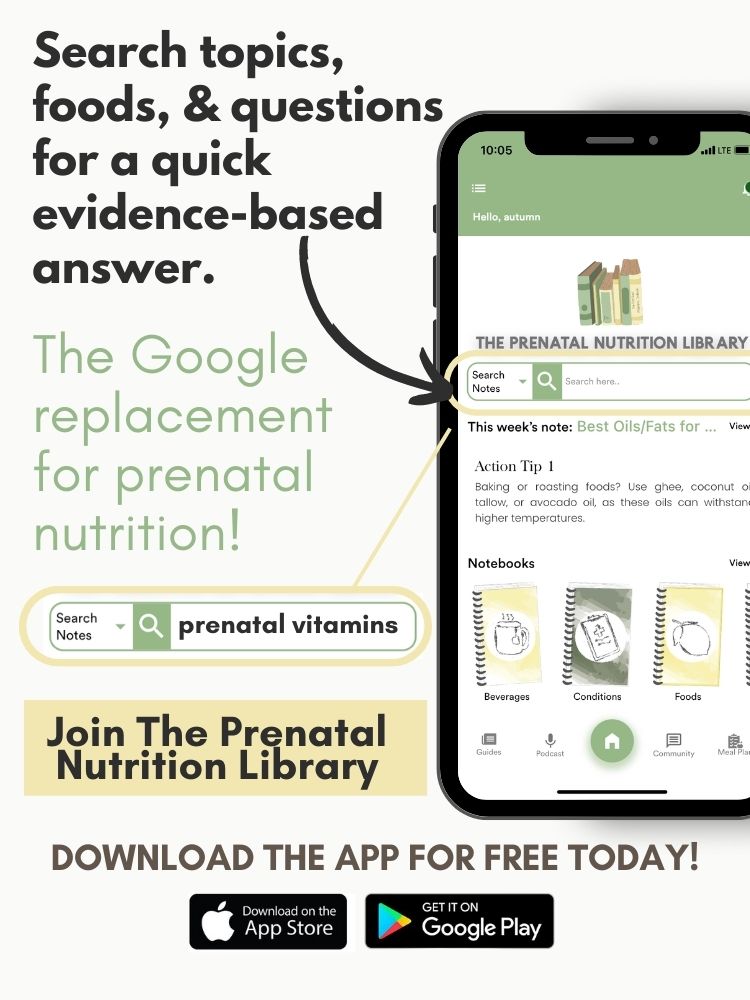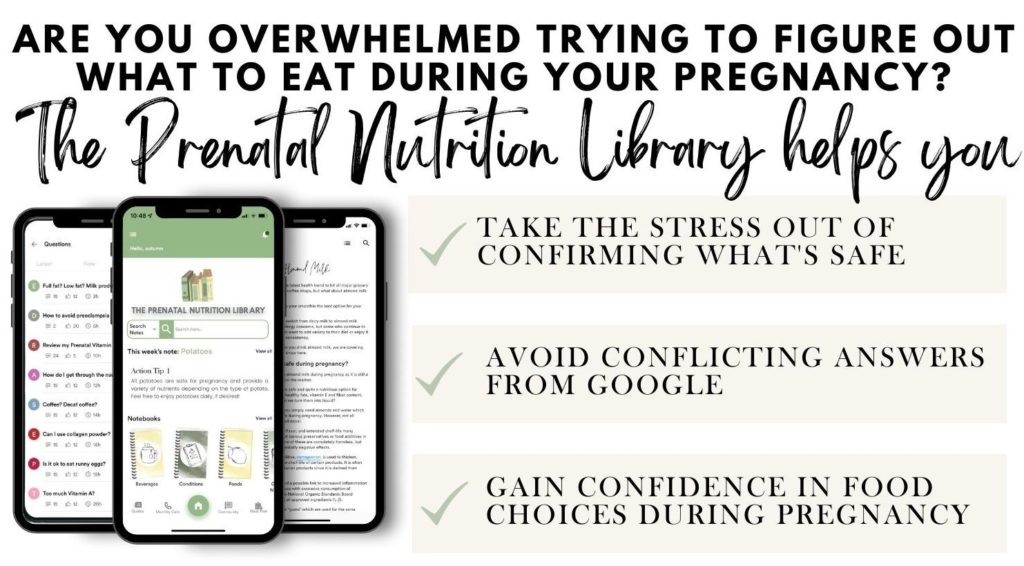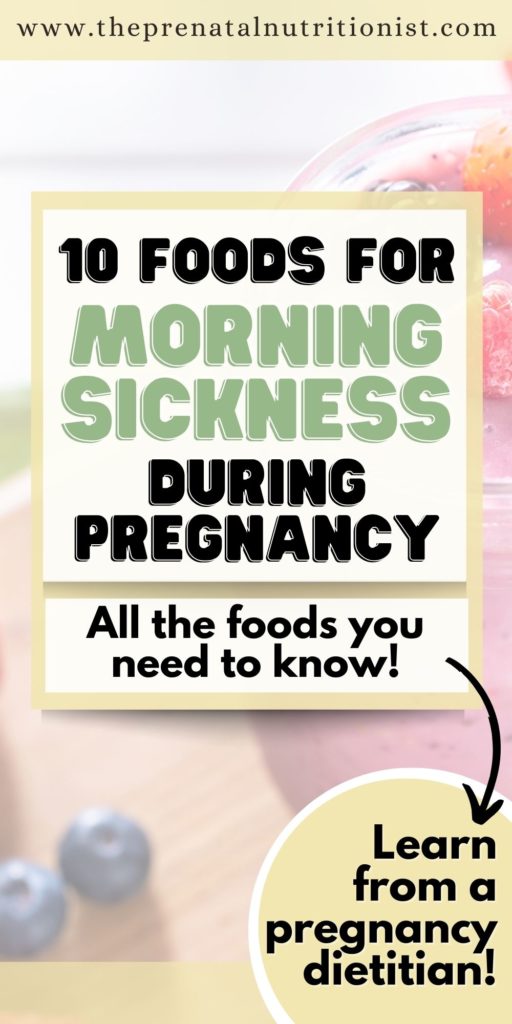
Pregnancy is an incredible yet significant life change that often comes with both physical and emotional adjustments. One very common symptom experienced in early pregnancy is nausea. Also known as “morning sickness.” It’s estimated that up to 70-80% of expectant mothers deal with nausea. It often starts at about 6 weeks of pregnancy and lasts through the first trimester, it can hit day or night or any time of day.
The exact reason why pregnant women experience morning sickness is unclear. Changes in hormone levels like human chorionic gonadotropin (hCG) are thought to potentially play a role in triggering nausea for some women, but there’s still much to be discovered. Typically, nausea subsides early in the second trimester or around the fourth month of pregnancy. However, unfortunately, for some pregnant individuals, nausea and vomiting can persist throughout the entire pregnancy. Dealing with constant queasiness can definitely impact quality of life and nutrition.
The good news is that many remedies can be tried to help provide relief or curb feelings of nausea. Some lifestyle approaches recommended include eating small, frequent meals or snacks, starting your day with protein, and staying hydrated. Additionally, some specific foods may also be more tolerable when battling symptoms of morning sickness.
In this article, I’m sharing a roundup of foods that research has shown may aid in reducing morning sickness symptoms for a healthy pregnancy experience and foods that may be more tolerable during this time, especially in small amounts if it’s all you can keep down. I hope this helps you gain valuable options for increasing selections and the ability to nourish your growing baby each day.
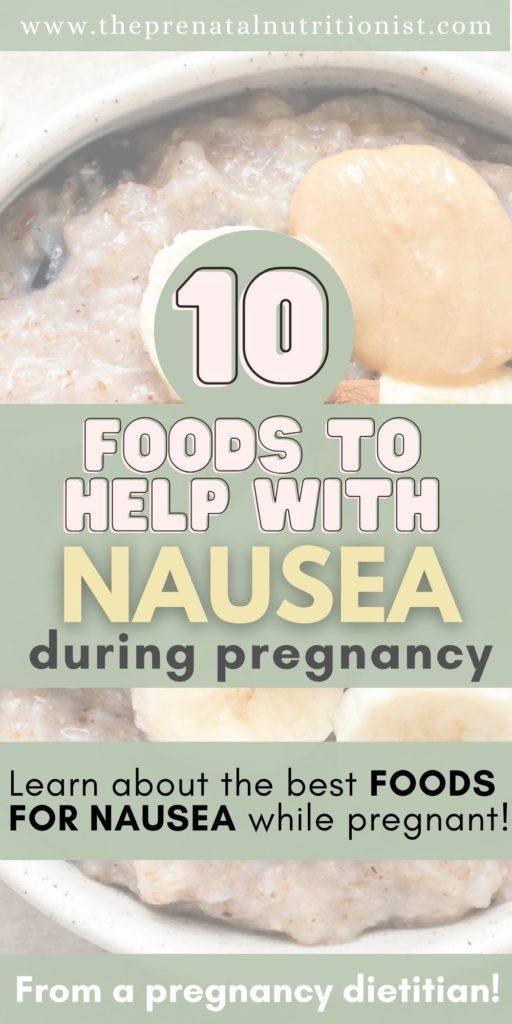
10 Foods That Help With Pregnancy Nausea
Crackers
Plain crackers are often recommended as one of the first foods to try when feeling nauseous. They are low in fiber and fat, which makes them gentle on the stomach. They also contain some salt, which can be helpful to replenish electrolytes lost through vomiting. Go for plain crackers and avoid heavily flavored or sugary varieties, which may upset your stomach further. Saltine crackers are a good example.
Eat a few plain crackers when the nausea hits to see if they help settle your stomach. Some pregnant moms like to keep a pack of crackers by their bedsides to eat first thing in the morning to help curb nausea.
Ginger
The root of ginger has been used as a natural remedy for upset stomach, motion sickness, and nausea for centuries. It is often one of the first foods to grab for managing morning sickness. Studies show ginger may be effective at relieving nausea during pregnancy as well. Ginger is safe to consume throughout pregnancy.
Ginger tea, ginger ale, and fresh ginger in recipes like smoothies or energy bites are simple ways to consume it. Try snacking on ginger, crystallized ginger, or drinking ginger tea when you feel sick. Fresh ginger root grated into soups, stir-fries, or smoothies is another easy way to add it.
Yogurt or Kefir
Fermented dairy products like yogurt and kefir provide good bacteria that help digestion. Probiotics are found in kefir and many types of yogurt. The probiotics can help promote regular bowel movements and alleviate constipation, another common cause of nausea during pregnancy, if it gets bad enough!
Plain Greek yogurt and kefir are great snack options. They are often well-tolerated protein sources during the hard weeks of morning sickness, too!
Yogurt is described as a “superfood” for pregnancy. Wondering why? To get the scoop on all the benefits of eating yogurt during pregnancy, click HERE.
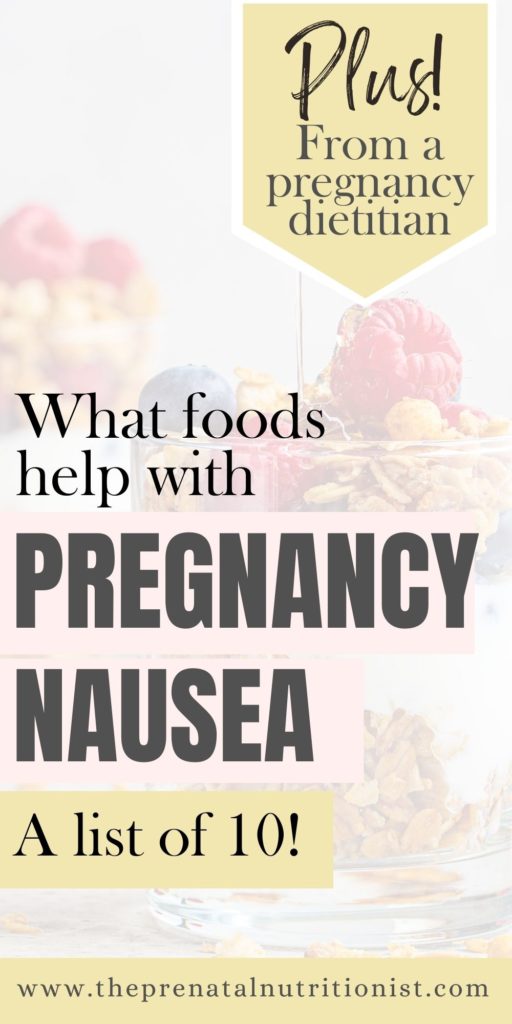
Bananas
Bananas contain vitamin B6, which can help reduce morning sickness symptoms. Their high potassium content makes them another great food source of electrolytes. Bananas are also lower in fiber and generally easy to digest.
Try adding more vitamin B6-rich foods to your diet, like bananas. Bananas paired with pistachios would be a great dose of vitamin B6 that reduces nausea. You could also try slicing up some bananas in Greek yogurt for protein, vitamins, and minerals.
Oatmeal
Porridge or oatmeal made with water or milk can be soothing and very filling. Slow-cooked oats are a good source of fiber, which can help prevent blood sugar spikes and subsequent crashes. Blood sugar dysregulation may trigger nausea in some women. Adding extra protein like collagen peptide powders or cooked eggs into oatmeal is also easy. Add toppings that sound good, like nut butter or fruit, for extra nutrients and flavor.
For more on the benefits of oatmeal during pregnancy, check HERE.
Cold foods
Hot foods that are rich in aroma and smells may trigger the nausea response in some women. Opting for cold foods and smoothies during the day may feel more appealing and sit better when feeling queasy. Some cold meal ideas include yogurt, popsicles, chilled soups, homemade fruit salads, or sandwiches. Staying hydrated is important. Cold fluids like ice water or no-added-sugar electrolyte beverages are helpful.
Crackers and Cheese
A small snack of plain whole-grain crackers topped with pregnancy-safe pasteurized cheese can provide protein and be well-tolerated. The protein helps control blood sugar levels to possibly prevent nausea. However, strong-flavored, aged, or spicy cheeses may trigger nausea right now.
For more options, check out these snacks for nausea during pregnancy.
Dry Cereal
Sitting down to a hot cereal or oatmeal may seem unappealing when feeling nauseous. Instead, you can choose a dry, low-sugar whole-grain cereal like shredded wheat or bran flakes. It is dry with little smell, so many people find cereal sits well. You can easily eat it with milk to boost protein and fluids and support better blood sugar balance.
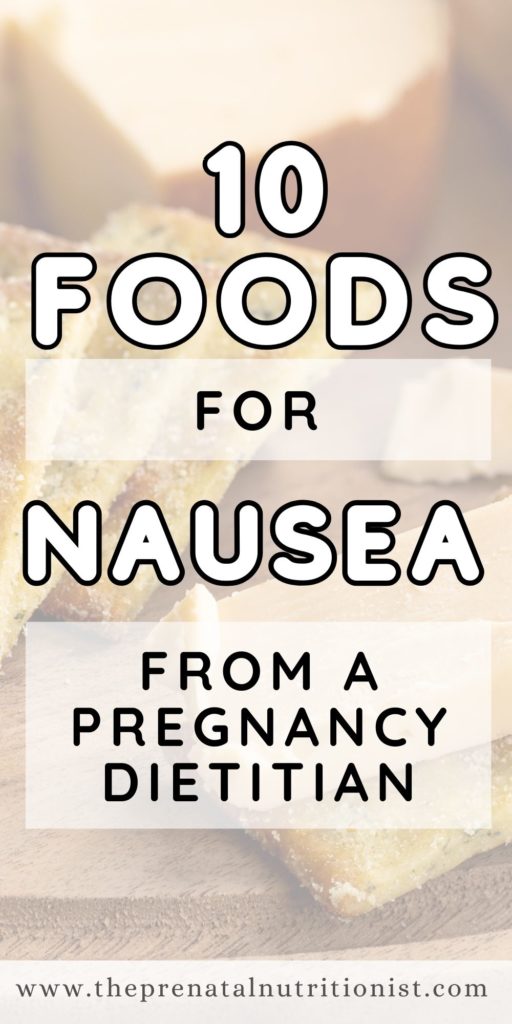
Peanut Butter or Nut Butters
Sometimes, nausea can stem from an empty stomach, a lack of protein, or both. This can be tough during pregnancy, when nothing, especially when protein foods, sound good due to aversions and nausea. A spoonful of peanut, almond, or sunflower seed butter offers some grams of protein, healthy fats, and flavor to potentially help curb nausea.
The combined protein and fat content makes for a slow, sustained energy release versus simple carbs that more rapidly spike blood sugar. Try natural nut butter on crackers, celery, or toast. Opt for varieties without added sugar.
Smoothies
When dealing with nausea and an upset stomach, it can be hard to keep down solid foods so try to drink fluids, like smoothies. If nothing sounds good, try a simple smoothie filled with fruits, a protein source, and possibly some tasteless vegetables like frozen cauliflower or a handful of spinach. Smoothies are great because you can adapt them to your taste preferences and any dietary restrictions.
Smoothies, including green smoothies, can be great for nausea because they are easy to digest and provide a significant boost of vitamins, minerals, fluids, and protein for nausea relief, depending on your ingredients. Add banana, nut butter, ginger, or avocado to your smoothie for an extra nausea-relieving kick. Be sure to incorporate a source of protein like Greek yogurt or protein powder into your smoothie to keep it blood sugar-friendly.
For meal and snack inspiration, check out these healthy breakfast ideas for pregnant women and these healthy pregnancy lunch ideas for work. And if you’re craving sweets, try one of these healthy sweets for pregnancy!
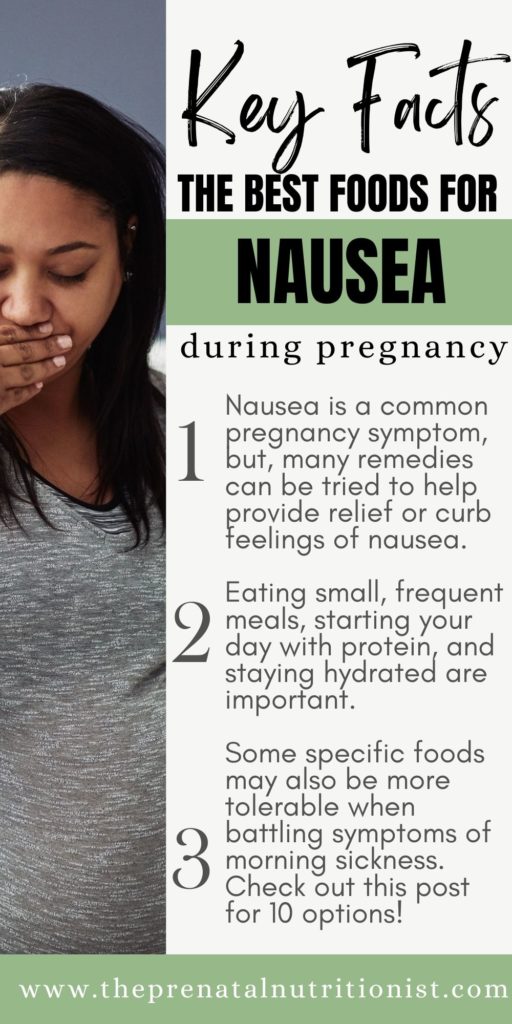
Certain foods may help to curb nausea and be well-tolerated when battling morning sickness.
As discussed in the post on “how to deal with food aversion during pregnancy,” nausea is very common. Trying some of these bland, easier-to-digest foods at the onset of queasiness or as regular meals and snacks may help reduce discomfort and support women in getting some beneficial nutrients during these challenging weeks and months.
Combined with prenatal vitamins, possibly a vitamin B6 supplement, maintaining hydration, and avoiding foods with strong smells that often seem to make nausea worse, incorporating some of these foods will hopefully help pregnant women feel better faster. Thus, the period of nausea and vomiting during pregnancy is more bearable. As always, speak to your healthcare provider about any continuous pregnancy symptoms.
For more tips and strategies to manage common pregnancy symptoms like food aversions, nausea, heartburn, and fatigue, check out The Prenatal Nutrition Library! You can actually download The Prenatal Nutrition Library app for FREE to take a sneak peek at what’s inside (and get a FREE 7-DAY MEAL PLAN FOR PREGNANCY!!). As always, we wish you a happy and healthy pregnancy and encourage you to check in for our latest releases and updates!


